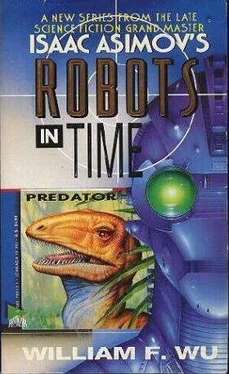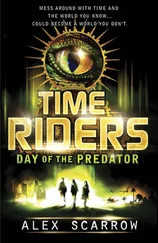William Wu - Predator
Здесь есть возможность читать онлайн «William Wu - Predator» весь текст электронной книги совершенно бесплатно (целиком полную версию без сокращений). В некоторых случаях можно слушать аудио, скачать через торрент в формате fb2 и присутствует краткое содержание. Год выпуска: 1993, ISBN: 1993, Издательство: Avon Books, Жанр: Фантастика и фэнтези, на английском языке. Описание произведения, (предисловие) а так же отзывы посетителей доступны на портале библиотеки ЛибКат.
- Название:Predator
- Автор:
- Издательство:Avon Books
- Жанр:
- Год:1993
- ISBN:ISBN: 0-380-76510-1
- Рейтинг книги:5 / 5. Голосов: 1
-
Избранное:Добавить в избранное
- Отзывы:
-
Ваша оценка:
- 100
- 1
- 2
- 3
- 4
- 5
Predator: краткое содержание, описание и аннотация
Предлагаем к чтению аннотацию, описание, краткое содержание или предисловие (зависит от того, что написал сам автор книги «Predator»). Если вы не нашли необходимую информацию о книге — напишите в комментариях, мы постараемся отыскать её.
Predator — читать онлайн бесплатно полную книгу (весь текст) целиком
Ниже представлен текст книги, разбитый по страницам. Система сохранения места последней прочитанной страницы, позволяет с удобством читать онлайн бесплатно книгу «Predator», без необходимости каждый раз заново искать на чём Вы остановились. Поставьте закладку, и сможете в любой момент перейти на страницу, на которой закончили чтение.
Интервал:
Закладка:
William F. Wu
Predator
This novel is dedicated to
Bill Moss,
in memory of all those colorful plastic dinosaurs
we used to play with,
and of our formative years together.
Special thanks are due for help in writing this novel to Michael D. Toman, as usual, for invaluable research aid; Dr. William Q. Wu, and Cecile F. Wu, my parents, for indulging my childhood interest in dinosaurs; Ricia Mainhardt; John Betancourt; and Byron Preiss.
The laws of robotics
1. A robot may not injure a human being, or through inaction, allow a human being to come to harm.
2. A robot must obey the orders given it by human beings except where such orders would conflict with the First Law.
3. A robot must protect its own existence as long as such protection does not conflict with the First or Second Law
Foreward
In “Robot Visions,” Dr. Isaac Asimov writes about a question inherent in any time travel story-whether individuals traveling in time will alter events that would have occurred without the interference of a time traveler. Most writers who tackle this question write about changing the past and whether doing so is desirable or not. The Good Doctor, once again exhibiting the originality of his own vision, chooses to focus on a more rarely examined concern: of traveling into the future, and the possible consequences of doing so.
Stories that merely take place in the future are not the same as stories about individuals who travel from their own time, whatever it is, to their future. To my knowledge, the first science fiction novel to tell such a story is the classic novel by H. G. Wells, The Time Machine. In it Wells writes of a man who travels to the distant future from Victorian England, the time and place in which Wells was writing the novel. However, Wells presented a dystopian vision of the future as a warning of what could happen if the rigid social and economic divisions of his own society worsened to the extreme. The possibility of avoiding that vision lay not with the time traveler, but with the people who lived in Wells’s time. Wells did not really examine whether his time traveler’s report to his friends back in his own time would bring about a different future.
Two theories of history influence the tale any writer tells about time travel. One belief is that only large forces such as technological advance, economic change, and the development of religions and philosophies determine the direction of history. The other theory is that any event, “no matter how small, sends out ripples of influence that profoundly affect all other events. An historian told me that his colleagues are about evenly divided in their support of these theories. Authors of time travel stories always write with one or the other implicit, if not explicit, in their work.
I first discovered the science fiction of Isaac Asimov as a child and have read both his fiction and nonfiction in the years since then. Writing time travel stories about his positronic robots and his Three Laws of Robotics is therefore a special honor for me, and I hope you will enjoy the Robots in Time series. By way of introduction, this book presents the late Dr. Asimov’s fantastic “Robot Visions.”
William F. Wu.
1
Mojave Center Governor sat in his office, deep in the underground city of Mojave Center. He was an experimental humaniform robot of a type that was new this year, 2140. Each of the Governor robots was currently running all the municipal systems of one entire, newly-constructed city. They were doing so under probationary status, monitored by a committee of scientists through their computer.
His office was in the middle level of the city, in the center of that level. He didn’t really need an office at all since most of his work was done through his radio link to the city computer or directly to municipal departments; further, he could plug into various terminals when necessary. However, he had learned that humans sometimes preferred doing business in an office, so he maintained a small room in Mojave Center for that purpose.
At the moment, MC Governor was alone. He plugged his humaniform forefinger into a wall jack. Inside the jack, the end of his finger opened and plugged into the system. He contacted the city computer.
“I am going to run a simulation program again,” said MC Governor. “I will continue my normal duties through my multi-tasking system. However, I instruct you not to transfer any communication or other interruption lower than Priority 5. When I have finished running the simulation, I will notify you.”
“Acknowledged,” said the city computer.
MC Governor returned his finger to human shape, breaking the shielded connection. For the sake of security, he told himself, he chose not to use radio communication concerning the simulation programs. Lately he had been running them more often than before.
He ran down his list of programs. They were standard simulation programs that all the Governors used to discover and correct potential problems and challenges without actually having to face them in real life. His favorites involved some sort of disaster that befell Mojave Center, requiring him to respond urgently under the Laws of Robotics to restore the situation to normal. Like all positronic robots, he was programmed so that his greatest imperative, and his greatest reward, was in obeying the Laws. The First Law of Robotics was, “A robot may not injure a human being, or, through inaction, allow a human being to come to harm.”
This time, he selected the program called Desert Flash Flood. It was essentially a form of role-playing game. He began running it. Suddenly he found himself standing in the main thoroughfare of Mojave Center, Antelope Valley Boulevard, with water a meter high pouring down the street.
MC Governor was a very tall, brawny robot. He ran through the water to a young woman who was stumbling and splashing helplessly, trying to hold a toddler in her arms. As MC Governor picked her up and strode through the current toward an escalator, he radioed the city monitors who controlled all the basic life functions.
“Shut down all electricity to nonessential services if they have failed to shut down automatically,” he instructed the computer, as he carried the woman and her child. “Run a status check on the emergency electrical systems providing essential services.”
Right now, his greatest worry was the electrocution of humans if broken power lines touched the flood water. As a Governor robot, he was a central control unit, capable of managing entire cities, from traffic to essential services and utilities, to environmental control and industry. The city had its own decentralized computer systems, which reported directly to him and took his instructions by way of his internal radio and video systems.
“Thank you,” the woman gasped, clutching her drenched toddler as MC Governor set her down on the rising escalator.
Almost immediately, the monitors reported that nonessential services were being discontinued. The escalator stopped moving, but the woman stumbled on up the steps. MC Governor waded back into the water toward a trolley full of humans stranded on one side of the boulevard. They were yelling and screaming in panic. Its robot driver was speaking calmly to his passengers, asking for patience.
The city monitors reported that the emergency power system was functioning safely.
“Send me all data related to the cause of the flood,” he ordered. At the same time, he moved behind the stranded vehicle. It normally ran on a battery-powered electric motor. Now the robot driver steered as MC Governor pushed the vehicle to the stationary escalator, where the driver began helping the humans onto it.
Читать дальшеИнтервал:
Закладка:
Похожие книги на «Predator»
Представляем Вашему вниманию похожие книги на «Predator» списком для выбора. Мы отобрали схожую по названию и смыслу литературу в надежде предоставить читателям больше вариантов отыскать новые, интересные, ещё непрочитанные произведения.
Обсуждение, отзывы о книге «Predator» и просто собственные мнения читателей. Оставьте ваши комментарии, напишите, что Вы думаете о произведении, его смысле или главных героях. Укажите что конкретно понравилось, а что нет, и почему Вы так считаете.












